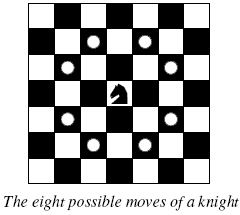A Knight's Journey
| Time Limit: 1000MS | Memory Limit: 65536K | |
| Total Submissions: 42462 | Accepted: 14437 |
Description
 Background
BackgroundThe knight is getting bored of seeing the same black and white squares again and again and has decided to make a journey
around the world. Whenever a knight moves, it is two squares in one direction and one square perpendicular to this. The world of a knight is the chessboard he is living on. Our knight lives on a chessboard that has a smaller area than a regular 8 * 8 board, but it is still rectangular. Can you help this adventurous knight to make travel plans?
Problem
Find a path such that the knight visits every square once. The knight can start and end on any square of the board.
Input
The input begins with a positive integer n in the first line. The following lines contain n test cases. Each test case consists of a single line with two positive integers p and q, such that 1 <= p * q <= 26. This represents a
p * q chessboard, where p describes how many different square numbers 1, . . . , p exist, q describes how many different square letters exist. These are the first q letters of the Latin alphabet: A, . . .
Output
The output for every scenario begins with a line containing "Scenario #i:", where i is the number of the scenario starting at 1. Then print a single line containing the lexicographically first path that visits all squares of the
chessboard with knight moves followed by an empty line. The path should be given on a single line by concatenating the names of the visited squares. Each square name consists of a capital letter followed by a number.
If no such path exist, you should output impossible on a single line.
If no such path exist, you should output impossible on a single line.
Sample Input
3 1 1 2 3 4 3
Sample Output
Scenario #1: A1 Scenario #2: impossible Scenario #3: A1B3C1A2B4C2A3B1C3A4B2C4 实在是太粗心了,impossible一直写Impossible, 还有就是搜索方向要求按字典序(这个不是很会,参考了别人的搜索方向) wa代码#include <iostream> #include <cstring> #include <cstdio> using namespace std; #define mem(a) memset(a, false, sizeof(a)) bool vis[30][30]; int sum; int di[30], dj[30]; int n, m; int dx[] = {-2, -2, -1, -1, 1, 1, 2, 2}; int dy[] = {-1, 1, -2, 2, -2, 2, -1, 1}; void dfs(int x, int y){ vis[x][y] = true; di[sum] = x; dj[sum++] = y; for (int i = 0; i < 8; i++){ if (1 <= x + dx[i] && x + dx[i] <= m && 1 <= y + dy[i] && y + dy[i] <= n){ if (!vis[x + dx[i]][y + dy[i]]){ dfs(x + dx[i], y + dy[i]); } } } return ; } int main(){ int t; cin >> t; for (int k = 1; k <= t; k++){ cin >> n >> m; sum = 0; mem(vis); mem(di); mem(dj); dfs(1, 1); if (sum != n * m){ cout << "Scenario #" << k << ':' << endl; cout << "impossible" << endl; } else{ cout << "Scenario #" << k << ':' << endl; for (int i = 0; i < sum; i++){ printf("%c%d", di[i] - 1 + 'A', dj[i]); } cout << endl; } if (t != k) cout << endl; } return 0; }
ac代码#include <iostream> #include <cstring> #include <cstdio> using namespace std; #define mem(a) memset(a, false, sizeof(a)) bool vis[30][30]; int flag; int di[30], dj[30]; int n, m; int dx[] = {-2, -2, -1, -1, 1, 1, 2, 2}; int dy[] = {-1, 1, -2, 2, -2, 2, -1, 1}; void dfs(int x, int y, int num){ di[num] = x; dj[num] = y; if (num == n * m){ flag = true; return ; } for (int i = 0; i < 8; i++){ if (1 <= x + dx[i] && x + dx[i] <= m && 1 <= y + dy[i] && y + dy[i] <= n){ if (!vis[x + dx[i]][y + dy[i]] && !flag){ vis[x + dx[i]][y + dy[i]] = true; dfs(x + dx[i], y + dy[i], num + 1); vis[x + dx[i]][y + dy[i]] = false; } } } } int main(){ int t; cin >> t; for (int k = 1; k <= t; k++){ cin >> n >> m; mem(vis); mem(di); mem(dj); flag = false; vis[1][1] = true; dfs(1, 1, 1); cout << "Scenario #" << k << ':' << endl; if (!flag){ cout << "impossible" << endl; } else{ for (int i = 1; i <= n * m; i++){ printf("%c%d", di[i] - 1 + 'A', dj[i]); } cout << endl; } if (t != k) cout << endl; } return 0; }




















 865
865

 被折叠的 条评论
为什么被折叠?
被折叠的 条评论
为什么被折叠?








